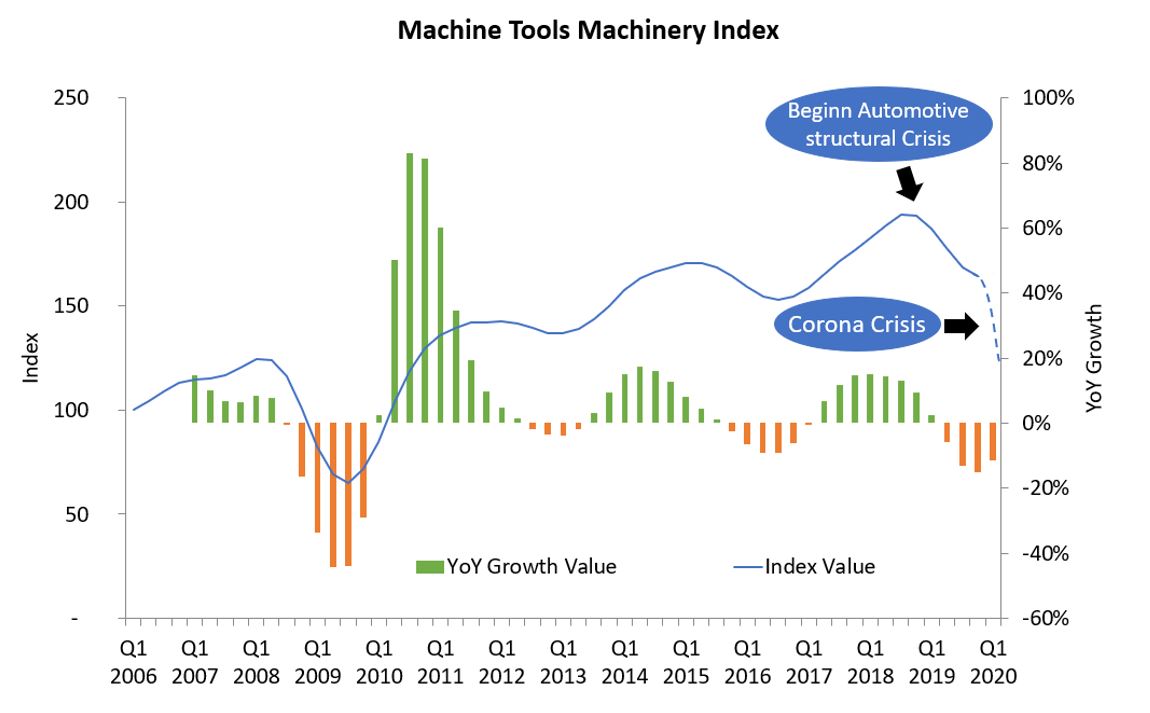

The Corona Crisis is not over yet, but many industrial sectors are slowly getting back to normal. Yet, coming from a pre-existing downwards trend due to the structural crisis in the automotive industry, the machine tool industry was hit especially hard in the past months. Recently the Association of German Machine Tool Builders (VDW) reported a drop of 20 percent in Q1 2020 in machine tool production and loss of 25 percent in order intake for the German machine tool manufacturers. The same trend applies to other countries.
Fluctuations in the economy and crisis have always been part of the game. One of the economists, who dedicated his life to the economic business cycle was Joseph Schumpeter. He established the theory of the “creative destruction”. Schumpeter identified the crisis as the initial start of accumulating innovations, aiming to restore a balance in the industry. Companies find them self in a sudden change of their market environment, which breaks their business routine. Although, the financial situation might be challenging, the necessity for change can not be ignored. According to his theory, companies that adapt proactively and innovate their business to accommodate the new situation will benefit the most from the upswing and after the crisis.
The trigger of a crisis always plays a crucial role. In the case of an external effect, structural and organizational adaptions might be necessary. In case of a radical innovation, that leads to a disruption of the industry and technical innovations that are required to keep up with competitors. In this context Schumpeter defines fife different kinds of innovation:
Considering the current situation in the machine tool industry, two crises converge and intensify the challenges for all shareholders of the industry. A decreasing demand of combustion engines and the rise of the e-car triggered the latest downwards trend of the machine tool industry. The corona crisis reinforced this trend through factory lockdowns and interrupted supply chains. Furthermore, car orders declined radically during the lockdown. In some countries, like China by as much as 90 percent.
Of course, the current situation is probably the worst-case scenario for manufacturers and their employees. But at the same time, it offers great potential of new innovations. The crisis already boosted digital and remote work to a level, which we anticipated to take many more years to achieve. The demand for industrial remote services and the corresponding offerings increased strongly in the last months. Companies should now take the time to identify the changing requirements and technologies that will be needed after the crisis and start to work on the structural and technical innovations to develop beyond these quick fixes.
Once the corona crisis is over, the structural change in the automotive industry won´t be over. More than before, technologies for the manufacturing of components for e-cars will be required. And the next development is already on its way. The car industry will further diversify their drive technologies and therefore new manufacturing techniques are necessary.
Nevertheless, as the five kinds of innovation by Schumpeter show, it is beyond pure product innovation. During the crisis, some OEMs already announced a diversification of their portfolio and actively strive to expand into new customer industries, in particularly towards life sciences. With the renewal of structures and routines, rigid business models are no longer hindering the implementation of new approaches and new market segments.
When the corona crisis is over, the new market conditions will become clear and show which companies have successfully used the crisis to innovate or adapt their business. For now, it is important to not miss the chance to get ready for the new market requirements, while handling the challenges of the current situation.


